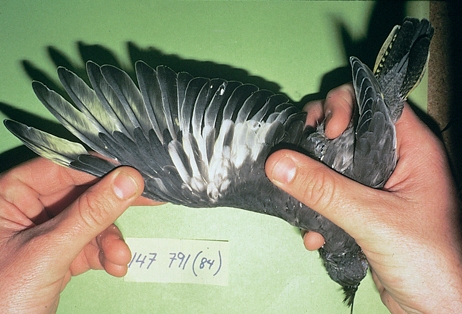Difference between revisions of "Avian Medicine Q&A 10"
| Line 21: | Line 21: | ||
In all these cases, birds moult and grow normal feathers some time after the phase of rapid growth is complete. | In all these cases, birds moult and grow normal feathers some time after the phase of rapid growth is complete. | ||
| − | |l1= | + | |l1=Achromatosis |
|q2= What is the significance? | |q2= What is the significance? | ||
|a2= The major significance of achromatosis is as a serious sign of an underlying nutritional deficiency. Unlike signs of some other deficiencies, it is not dependent on the severity of the deficiency except in extreme cases where the feathers may not grow at all. | |a2= The major significance of achromatosis is as a serious sign of an underlying nutritional deficiency. Unlike signs of some other deficiencies, it is not dependent on the severity of the deficiency except in extreme cases where the feathers may not grow at all. | ||
| − | |l2= | + | |l2=Achromatosis |
|q3= What treatments are needed to return feathers to their normal colour? | |q3= What treatments are needed to return feathers to their normal colour? | ||
|a3= The proper course of action is to supply the limiting nutrient and, if the bird is still growing, observe growing feathers for normal pigmentation. | |a3= The proper course of action is to supply the limiting nutrient and, if the bird is still growing, observe growing feathers for normal pigmentation. | ||
When growth is complete, a reduction in nutrient requirements occurs. This reduction in requirements may allow a diet inadequate for growth to serve as an adequate maintenance diet, allowing the bird to produce normal feather colours. In this case no treatment is required. | When growth is complete, a reduction in nutrient requirements occurs. This reduction in requirements may allow a diet inadequate for growth to serve as an adequate maintenance diet, allowing the bird to produce normal feather colours. In this case no treatment is required. | ||
| − | |l3= | + | |l3=Achromatosis#Treatment |
</FlashCard> | </FlashCard> | ||
| Line 36: | Line 36: | ||
desc none}} | desc none}} | ||
[[Category: Avian Medicine Q&A]] | [[Category: Avian Medicine Q&A]] | ||
| − | |||
Latest revision as of 21:57, 18 August 2011
| This question was provided by Manson Publishing as part of the OVAL Project. See more Avian Medicine questions |
These feathers show a condition known as Achromatosis or failure to lay down normal feather pigments.
| Question | Answer | Article | |
| What is the cause? | Achromatosis is caused by a variety of nutritional deficiencies in different species.
In this case the cause is choline deficiency during growth. A lysine deficiency during growth causes achromatosis in dark breeds of chickens, turkeys and quail, but not in rock doves or cockatiels. Achromatosis is caused by a riboflavin deficiency in growing cockatiels. In all these cases, birds moult and grow normal feathers some time after the phase of rapid growth is complete. |
Link to Article | |
| What is the significance? | The major significance of achromatosis is as a serious sign of an underlying nutritional deficiency. Unlike signs of some other deficiencies, it is not dependent on the severity of the deficiency except in extreme cases where the feathers may not grow at all.
|
Link to Article | |
| What treatments are needed to return feathers to their normal colour? | The proper course of action is to supply the limiting nutrient and, if the bird is still growing, observe growing feathers for normal pigmentation.
When growth is complete, a reduction in nutrient requirements occurs. This reduction in requirements may allow a diet inadequate for growth to serve as an adequate maintenance diet, allowing the bird to produce normal feather colours. In this case no treatment is required. |
Link to Article | |
